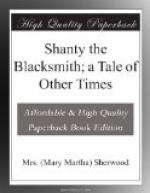He had, in his various speculations, so entirely neglected his own affairs for some years past, that poverty, nay actual penury, was staring in his face. He had formerly mortgaged, by little and little, most of his lands, and nothing now remained to make money of, but the Castle itself and a few acres around it, with the exception only of a cottage and a small field, hitherto occupied by a labourer, which lay in a kind of hollow on the side of the knoll, where the entrance of the secret cavern was. This cottage was as remote from Dymock’s Tower in one way, as Shanty’s shed was in another; although the three dwellings formed together a sort of equilateral triangle. Mr. Dymock long suspected that this labourer had done his share to waste his substance; and once or twice it had occurred to him, that if he left the Castle he might retire to the cottage. But yet, to part with the Castle, could he find a purchaser, would, he feared, be death to Mrs. Margaret, and how would Tamar bear it?—this glorious Maid of Judah, as he was wont to call her,—this palm tree of Zion, this daughter of David,—the very fine person, and very superior air of Tamar having confirmed him in the impression of her noble birth. It was whilst these heavy thoughts respecting what must be done in the management of his affairs dwelt on his mind, that the same man who had finished the unfortunate plough appeared again in Shanty’s shed.
The old man recognized him immediately, although fourteen years had much changed his appearance, and he at once charged him with having had some concern with the woman who left the child.
The well-acted astonishment of the vagrant, for such he was, silenced Shanty, though it did not convince him that he was mistaken in his conjecture. However, the old man, changing his mode of attack, and regretting that he had put the stranger on his guard by giving him so home a thrust, pretended to be convinced, and entered into easy conversation with him; amongst other things asking him if perchance he knew of any one who wanted to purchase an estate?
“Aye!” said the vagrant, to whom as we small have the pleasure of introducing him again, we think it may be well to give the name of Harefoot,—“Aye! old gentleman, and might one ask where this estate of yours may be?”
“It is of no consequence,” replied Shanty, “I answer no questions, as not being empowered so to do. At all events, however, the estate is not far from hence, and it is a magnificent place, I promise you, More’s the pity, that those who have owned it for some hundreds of years, should be compelled to part with it.”
Other matters were then introduced, and Shanty endeavoured to wind about Harefoot, but with little success; for, deep as he thought himself, he had one deeper to deal with. In truth, poor Shanty was but a babe in cunning, and the vagrant departed, without having dropped a single hint which could be taken hold of respecting Tamar. In the meantime troubles were pressing upon poor Dymock, the interest of moneys lent on the motgage was not forthcoming, and the Laird having no better friend (and as to a sincerer he needed none,) than poor Shanty, used from day to day to go down to the shed, to open his heart to the old man.




